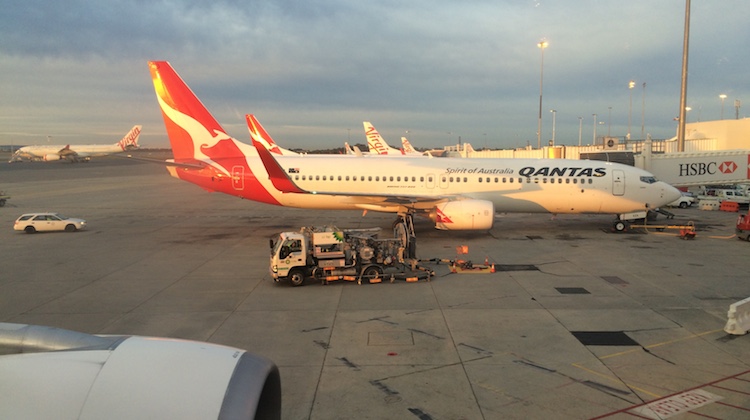
Qantas has posted a double digit decline net profit for the 2018/19 first half as higher fuel costs hit the bottom line.
The airline group said net profit for the six months to December 31 2018 came in at $498 million, down 16.3 per cent from $595 million in the prior corresponding period.
Revenue rose 5.8 per cent to $9.21 billion, Qantas said in regulatory filing to the Australian Securities Exchange (ASX) on Thursday.
Qantas chief executive Alan Joyce said higher oil prices were a “significant headwind” for the airline group in the half, with the total fuel bill increasing by $416 million.
“We moved to quickly recover as much of the cost as we could,” Joyce said in a statement.
“That’s easier to achieve in the domestic market than on longer international routes, where fuel is a much bigger factor, and that’s reflected in the segment results we’re reporting today.
“For the business to recover so much of that extra cost, particularly given how fast the oil price rose, shows that we’re well positioned.
“It’s this resilience that gives us confidence about our full year result, and enables us to keep investing and keep delivering shareholder returns.”
Joyce said a weaker Australian dollar and higher commissions also weighed on half year result.
Global oil prices had a volatile 2018. In October, Brent Crude Oil reached four-year highs of close to US$86 per barrel as tensions in the Middle East and the United States imposition of sanctions on Iran sent jitters through commodities markets.
However, crude then began steady retreat to its lowest level in more than 12 months at about US$62 a barrel in December as fears of reduced supply from the Iran sanctions proved overblown.
At February 15 2019, the International Air Transport Association (IATA) jet fuel price monitor was up about 5.1 per cent from a year ago.
Underlying profit before tax, which excludes some one-off items and was regarded as the best indication of financial performance, fell 18.7 per cent to $780 million, from $959 million in the prior corresponding period.
Qantas’s domestic business reported underlying earnings before interest and tax (EBIT) of $453 million for the first half, up marginally from $449 million in the prior corresponding period.
Joyce said there was improving demand in Western Australia, where the airline group added about 10 per cent more capacity.
“Broadly, the domestic market remains well balanced,” Joyce said.

Qantas international suffered a 60 per cent decline in underlying EBIT, which came in at $90 million for the half as fuel costs rose $216 million.
Joyce said the international business was “heavily impacted” by higher fuel costs due to the long-haul nature of the airline’s network.
“We remain very positive about the fundamentals of Qantas international,” Joyce said.
Meanwhile, Qantas said its Jetstar business reported a 20 per cent fall in underlying EBIT, which came in at $253 million for the half.
In terms of the fleet, Qantas said it expected to withdraw three Boeing 747-400s by June 30 2019, leaving seven of the iconic aircraft in the fleet. One of those, VH-OJS, was retired earlier in February.
All 747-400/400ERs were expected to be withdrawn by the end of 2020.
While Qantas did not provide profit guidance for the rest of 2018/19, Joyce said forward bookings remained strong and noted oil prices had declined from the peaks of late 2018.
Meanwhile, the company said capacity growth on international routes into and out of Australia had slowed, while it has been flat in the domestic market.
Qantas said it expected capacity across its Jetstar and Qantas domestic and international networks to be flat in the second half of 2018/19.
“These factors point to a strong second half, and we expect to completely recover our increased fuel costs by the end of this financial year,” Joyce said.
“We are mindful of potential signs of weakness in the broader economy and we’re always adjusting capacity to meet demand in individual markets – but overall revenue and yield indicators remain positive.”
“Above all, the resilience we’ve built into the business gives us plenty of confidence about our performance going forward.
The company declared an interim dividend of 12 cents per share, fully franked. It also announced a share buy-back program worth $305 million.




